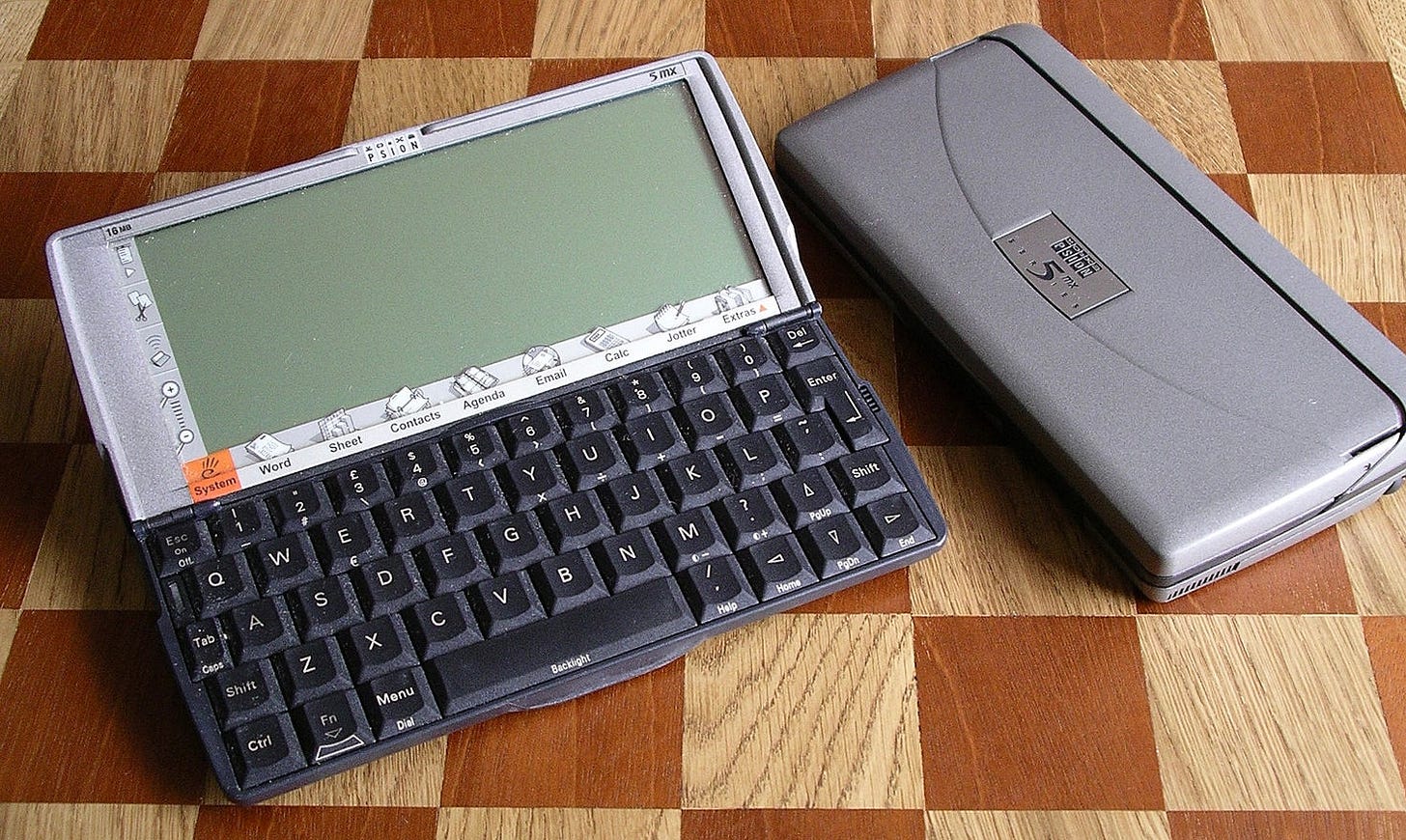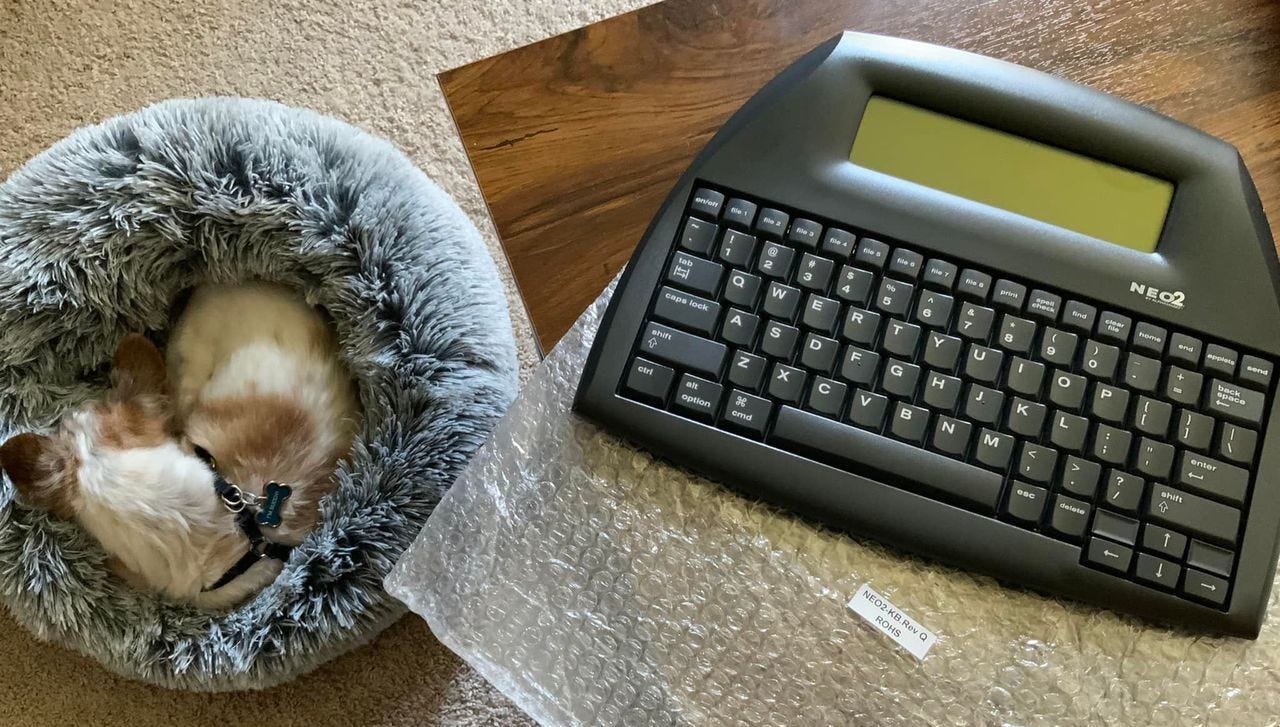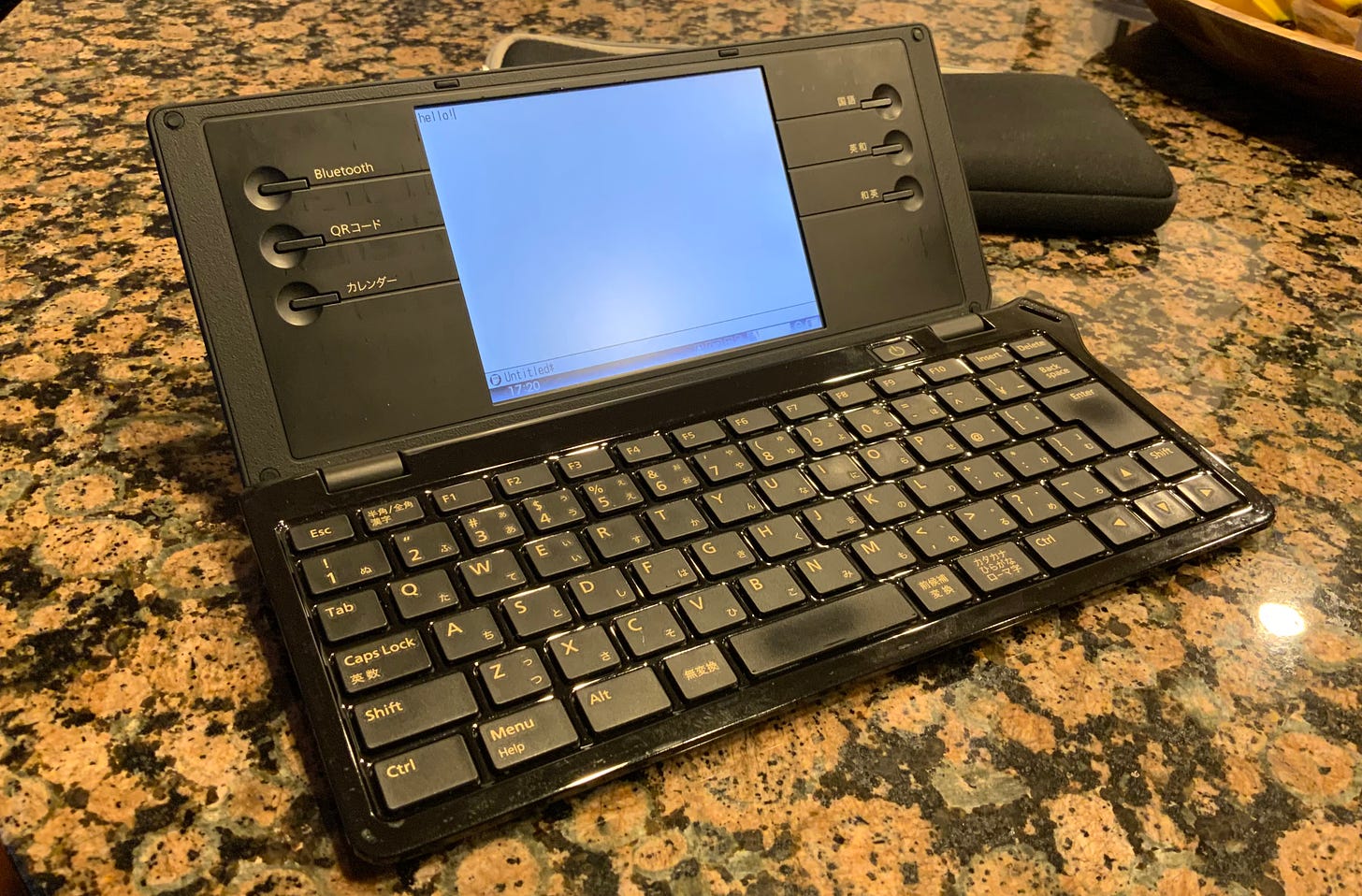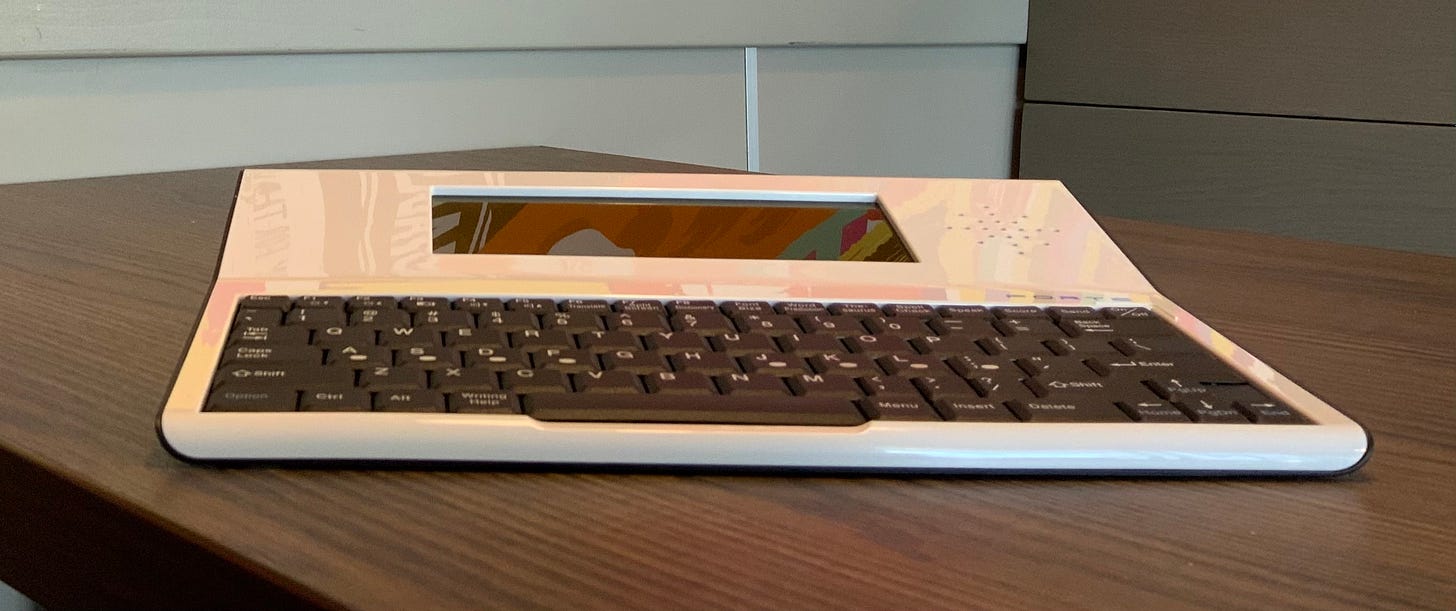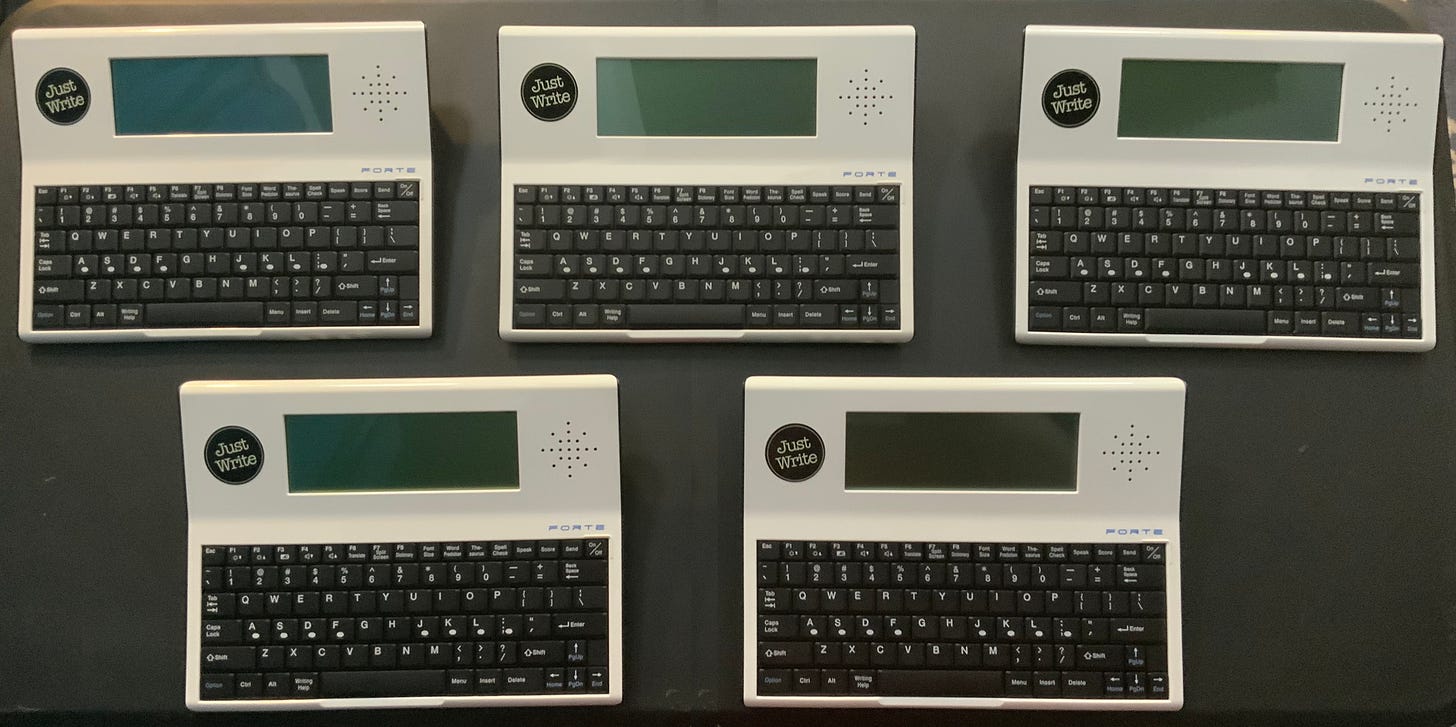The Writer With ADD
Please allow my search for a distraction-free keyboard explain the twisty world of Attention Deficit Disorder.
Explaining ADD can be difficult. It’s a definition that is as illusive and varied as my next possible random thought…
I certainly had no idea what it was when my own symptoms went overboard. I told my doctor that something was wrong. I was broken. I had lost focus, bills were piling up, and I had locked my keys in the car so many times, that AAA started charging me per incident, as I surpassed their limit for such things. I thought I was going crazy.
Thankfully, I wasn’t going crazy - I had ADD.
Sadly, I had missed many opportunities, and had not finished many things - I had ADD.
A double-edged sword, to be sure. A stunning revelation in my late thirties. But when I was a child, there was no understanding of ADD - I was simply the bright student who didn’t pay attention. The one who skated by tossing in the past homework assignments at the last minute. Even newly-armed with this knowledge, and subsequent various medications to help with focus, I was already deeply entrenched in job, family, and whatever pops up in front of you as you move through mid-life.
Now, in my fifties, I find myself trying to ‘catch up’ on the projects of the past. One of those things is my writing. I have numerous unfinished stories and concepts and dialogues, scribbled on tattered pieces of paper, and saved in old Word-compatible files from a Palm Pilot that have been languishing in limbo since 1998.
One of the key stumbling blocks for a person with ADD, is distractions. Something as small as a question, posed to you as you were about to do something else, or a random episode of Gilligan’s Island, as you are passing the television in the living room on the way to do something else. If I wanted to actually finish what I was writing, I needed to write on a device that wasn't connected to the internet. It couldn’t have the ability to alert me, or tell me there’s an email, or update the weather - It needed to be a stupid device in a world of smart things. And I don't mean simply shut off the wifi on a smart device, as a computer or tablet is still loaded with a plethora of attractive, time-wasting baubles, all just a click away.
Finding an unconnected, singular device in a very connected world was not an easy task. I needed some kind of keyboard with a screen. A word-processor on which I could save my writing and then transfer to my connected things for further editing and distribution. Making a quick search, I found that distraction-free writing was an actual thing that people were constantly striving for, and sure enough, I found a company dedicated to such things. I ran accross the Freewrite.
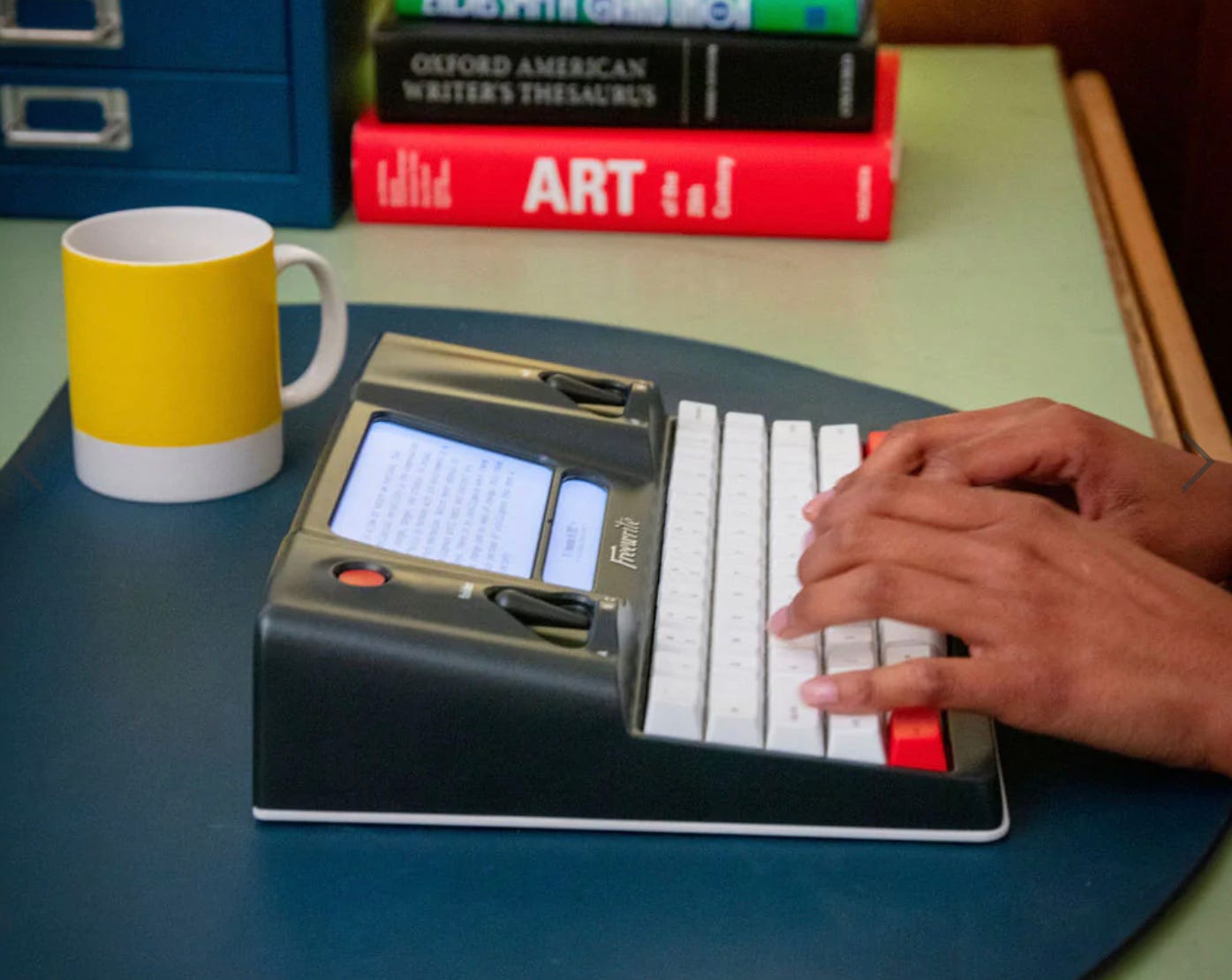
Freewrite’s idea of distraction-free writing is something that looks and acts like a typewriter, with a built-in e-ink screen. The Freewrite, in both its traditional desktop version and more portable, travel form, automatically saves your files to the cloud, but has no other bells or whistles - It’s a singular item, with a singular purpose. Perfect - But also perfectly expensive. I wasn't about to spend almost seven hundred bucks after shipping, just to be UNconnected - there was something inherently wrong with that price/no-features combination. They seem really nice, and I do not fault you for thinking it's a great way to go (many writers have) - But it was a rather expensive route to take.
Back in "the day" (the late 90’s, that is), I had spent a couple of years with a Psion Series 5 - a neat little almost pocketable unit that had a keyboard built in. It was amazing, but flawed; the hinges that closed its clamshell design quickly broke, and the screen eventually died. I then moved on to the more traditional, accepted tech of the time - a Palm with a detachable, foldable keyboard. Surely, I could find some old stuff, like this past technology, that could still communicate with my modern stuff, and not cost the preverbal arm and leg.
Easier said than done. You can still find the Psion in the modern world, but eBay prices were really not great for something I knew from experience had a limited life-span. And Palm? Getting that to actually connect to modern computers was like a poodle in a circus jumping through flaming hoops on a high-wire - It looked to be more trouble than it was worth.
With another search, I ran across the Alphasmart Neo. It was a keyboard made for schools, just before computers took over. Unfortunately, Alphasmart did not survive through that period of change, but the keyboards live on. They sport a small LCD screen, and memory slots for text files. I picked up one on ebay for around 100 bucks. A “new” one, so to speak, still in its plastic wrap from a group of units found at a school. The Neo is still connectable to a modern computer via the USB port: Plug it in, and your computer sees it as an external keyboard. You transfer a file by opening a blank word processing document on the computer, and the Neo literally "types" the text of your saved file into the document. The Neo uses three AA batteries, which seem to last just shy of forever, since the LCD screen draws very little power.
The only problem I had was its size. Having a full-sized keyboard is great, but that made it a bit bulky for travel. Not impossible, but a little tough to throw on a plane tray table during a long flight. I decided to take another look, and see what other older keyboards might be lurking about.
I found probably the most compact keyboard and screen combo imaginable: The Pomera 100. The Pomera is a laptop keyboard with a backlit LCD screen that folds over on top of it. The best part? It has an SD card port on the side. Perfect to pop into your currrent computer for file transfers. This type of word-processor is popular in Japan, which is the unit's first language. There is an option, however, to switch to English. This one also runs for incredibly long stretches of time on just two AA batteries.
Unfortunately, there was a little glitch for the Pomera, as well. While, yes, english is an option, the keyboard is UK english - For this American, the darn apostrophes, quotes, parentheses, colons and semi-colons are on different keys. I would start writing some dialogue, and found every sentence started with an asterisk instead of a quote. So, even though I was charmed by the Pomera, I took another look out in the wild.
While it didn't fold lilke the Pomera, imagine the Neo from above, but smaller, much more compact, with more modern connectivity and even more functionality. I found the Advanced Keyboard Technology’s Forte. AKT is, sadly another learning company that couldn’t compete with the computer age. I acquired one from a very nice lady who used it in her classroom with her students, had taken very good care of it, and even had the manual and case for it. I LOVE things that have cases. Every electronic device in the world should come with a case…
The Forte can do the same cool "type your document" trick to get your text into your computer, but it also has USB functionality, so you can save files to a USB stick and transfer them to your computer. Also built for the classroom, the Forte has a built-in calendar with alert function, as well as the ability to have multiple users, instead of just one lone typist.
Oh, and it talks. Did I mention that? It has a text to speech function. Sure, It sounds like Stephen Hawking on a bad day, but it talks, dammit!
Of course, as with everything I had found thus far, it also had a flaw. Not of style, nor of function, but of battery. The internal battery was, of course, old and dying. The Forte was made to be charged and, unfortunately, there was NO replacement battery. I found someone online who built a battery for a different model of keyboard: Three AA rechargeables, wrapped-up together with tape, into a similar cylinder configuration as the original battery. Not bad - But, since my Forte had an actual battery door, I bought a three AA battery holder, hoping to simply use traditional rechargeable batteries. Just look at that the pictures below. Is that not slick? I could now recharge using the original power adapter, and replace the three batteries when they finally gave up the ghost. I had future-proofed this puppy for the next generation.
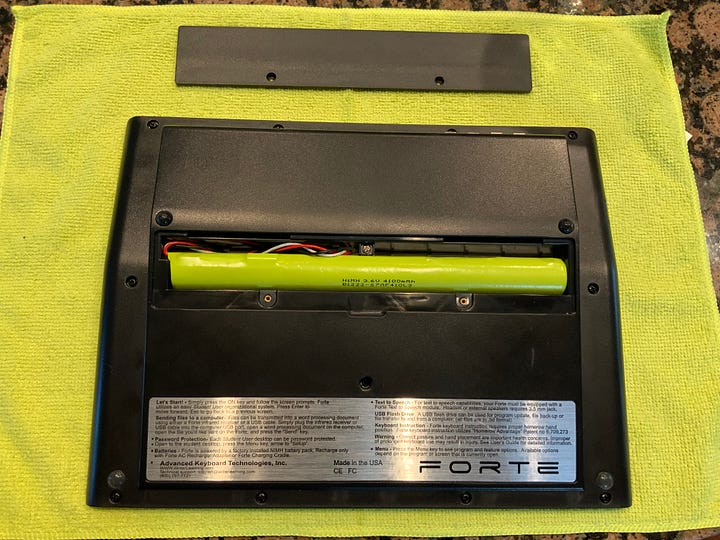
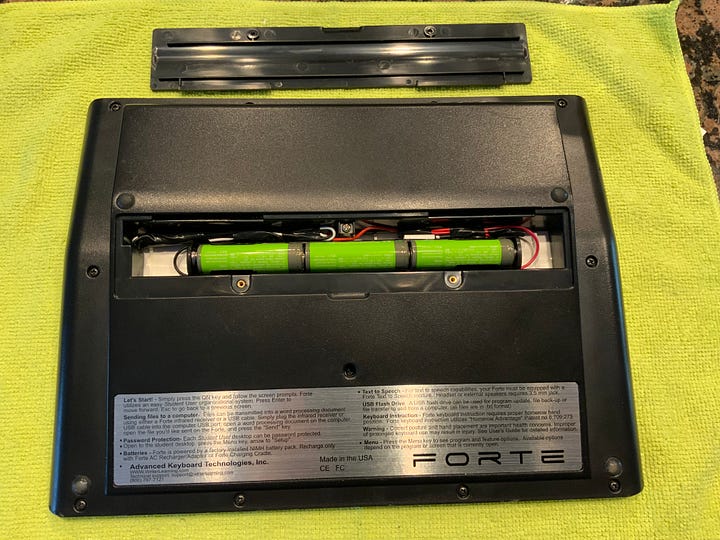
Since I had performed the battery overhaul, I was feeling very successful, and rather confident, overall - I decided to take another look online. Perhaps I could save a few more of these Fortes, and make a buck or two to offset the cost of my previous keyboard experiments. Sure enough, as fate would have it, there was a person selling a group of them.
My confidence was soon dashed, however. When they arrived at my home, I found that three were broken beyond repair, hidden towards the back of the bunch in the pictures (beware nefarious sellers on eBay), and one had a bad screen that I couldn’t replace. I lost four out of nine as soon as the box was opened. And buying the parts? Well, that wound up costing a bit more than I had hoped. It was simple fix, sure, since I had already hacked mine, but the whole process was time consuming, not to mention that a bunch of word processors all over the kitchen was a bit nerve-wracking for the rest of the family. Still, in the end, there was success, and a sense of satisfaction. I chronicled my journey of repairing them on the Alphasmart Facebook Community, and sold the revived Fortes to members of the group. Making money didn’t really happen, but, more importantly, I actually saved five of these very useful keyboards from extinction - All were now being used by other people to write. I was very pleased about that. My journey to find distraction-free writing had some positive benefit for others, and just maybe, the planet, as well.
Now, let’s end with this successful moment, a smile on our face for the betterment of humanity that has just occurred, and take a quick quiz. Let's see if you have been paying attention throughout this article, and if you have a truly keen intellect. Ready?
Question one: During my search for a keyboard that could help me write distraction-free, and save my old notes from extinction, how much actual writing did I accomplish?
And that, my friend, is ADD.




